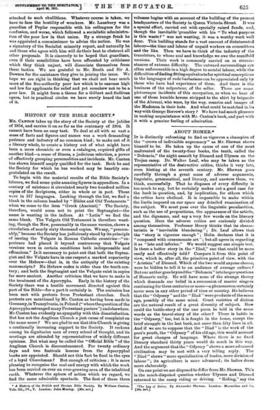HISTORY OF THE BIBLE SOCIETY.*
Ma. CANTON takes up the story of the Society at the jubilee of 1854, and carries it on as far as the centenary of 1904. It cannot have been an easy task. To deal at all with so vast a mass of facts and figures and names was a work demanding patience and industry of no common kind ; to make out of it a literary whole, to create a history out of what might have been a mere chronicle or even a catalogue, required gifts of another kind—a sense of fitness, a judicious selection, a power of effectively grouping personalities and incidents. Mx. Canton has shown himself amply qualified for the task. Both be and the Society for which he has worked may be heartily con- gratulated on the result.
To begin with the material results of the Bible Society's labours, we find some quite amazing figures in appendices. In a century of existence it circulated nearly two hundred million copies of the Scriptures, either in whole or in part. These were in 317 languages. Looking through the list, we find a blank in the column headed by " Bibles and Old Testaments " when we come to the item "Greek (Ancient)." The Society, therefore, would seem not to print the Septuagint—the name is wanting in the indices. At " Latin" we find the same blank. The Vulgate Old Testament is therefore want- ing, though the New, presumably in the same version, shows a circulation of nearly sixty thousand copies. We say, " presum- ably," because the Society has judiciously stood by its principle of issuing the Vulgate in Roman Catholic countries—" ex- perience had placed it beyond controversy that Vulgate versions were in certain conditions both indispensable and efficacious." Is it necessary to point out that both the Septua- gint and the Vulgate have in one respect a marked superiority over the Hebrew—that is, in the antiquity of the existing manuscripts ? No Hebrew codex is older than the tenth cen- tury; and both the Septuagint and the Vulgate exist in copies far more ancient. Another criticism that we have to make is the treatment of the Apocrypha. Early in the history of the Society there was a hostile movement directed against this part of the Bible—for a part it certainly is. The omission has been met with protests from Protestant churches. Such protests are mentioned by Mr. Canton as having been made in Germany, in Transylvania, in Poland (" where the q uestion of the Apocrypha estranged many Protestant pastors ") and elsewhere. Mr.Canton has evidently no sympathy with this dissatisfaction. But has not the Anglican Church a just cause of complaint on the same score ? We are glad to see that this Church is giving a continually increasing support to the Society. It reckons among its dignitaries men of every school of thought, and its meetings are attended by representatives of widely different opinions. But what may be called the " Official Bible " of the Anglican Church is discountenanced. For twenty ordinary days and two festivals lessons from the Apocryphal books are appointed. Should not this fact be final in the eyes of a loyal Churchman P But enough of criticism ; it is more pleasing to recognise the zeal and energy with which the work has been carried on over an ever-growing area of the inhabited earth. Whatever the sphere of action which we regard, we find the same admirable spectacle. The first of these three
• A History of the British and Foreign Bible Society. By William Canton. Vols. II1., IV., Y. London: John Murray. [30s, 'seta volumes begins with an account of the building of the present headquarters of the Society in Queen Victoria Street. It was a special effort, carried out with specially raised funds, and, though the inevitable 'grumbler with his " To what purpose is this waste ? " was not wanting, it was a worthy work well done. This building stands for a vast amount of disinterested labour—the time and labour of unpaid workers on committees and the like. Then we have to think of the industry of the translators, to whose zeal and knowledge we owe the manifold versions. Their work is commonly carried on in circum- stances of extreme difficulty. The outward surroundings are often unfavourable in a high degree to mental labour, while the difficulties of finding fittingequivaleute for spiritual conceptions in the languages of rude barbarians can be appreciated only by those who have bad experience of them. And there is the business of the colporteur, of the seller. There are some picturesque incidents of this occupation, as when we hear of one of these humble heroes stripped to the shirt by brigands of the Abruzzi, who wore, by the way, rosaries and images of the Madonna in their hats. And what could be matched in its way with George Borrow's story P We have bad much pleasure in making acquaintance with Mr. Canton's book, and part with it with a genuine feeling of admiration.


























































 Previous page
Previous page